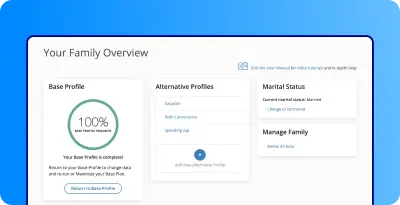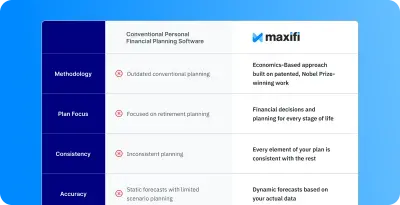Downsizing
Downsizing for retirement means moving to a smaller home or reducing possessions to cut costs and simplify life. People often downsize before or during retirement to lower monthly spending, free up equity to invest, and reduce upkeep.
For many retirees, housing represents the single largest monthly expense, making downsizing decisions significant both financially and emotionally. The process involves tradeoffs between financial benefits (reduced expenses, freed equity, lower maintenance costs) and lifestyle considerations (leaving familiar communities, adjusting to smaller spaces, proximity to family and services). While downsizing can strengthen retirement finances for many individuals, it doesn't universally result in savings, as smaller homes in desirable locations may cost as much as larger homes in less convenient areas, and transaction costs can consume significant portions of sale proceeds.
This guide explores why downsizing matters in retirement, common pitfalls to avoid, alternatives to traditional downsizing, strategies for successful downsizing, and important considerations beyond housing costs. Whether evaluating downsizing as part of retirement planning or seeking to understand the full financial and lifestyle implications, these educational concepts provide context for discussions with financial advisors, tax professionals, and real estate professionals.

Key Takeaways
- Downsizing involves moving to a smaller home to reduce monthly expenses, free up home equity, and simplify maintenance and lifestyle
- Housing is often the single largest monthly expense for retirees, making downsizing decisions financially significant
- Primary home sale exclusion allows $250,000 for singles ($500,000 for married couples filing jointly) in tax-free capital gains if you've lived in the home 2 of the past 5 years
- Downsizing doesn't always save money, as smaller homes in desirable locations can cost as much or more per square foot than larger homes elsewhere
- Emotional and lifestyle factors matter as much as financial considerations including leaving familiar communities, proximity to family, and adjustment to smaller spaces
- Universal design features support aging in place including single-level layouts, wider doorways, zero-step entries, and accessible bathrooms
- Alternatives to downsizing include aging in place with home modifications, renting out space, or reverse mortgages for those 62 and older
- Geographic location significantly affects retirement costs including state income taxes, property taxes, healthcare access, and overall cost of living
- Professional guidance is commonly considered valuable given that home equity often represents the largest asset in a retiree's portfolio
Why Downsizing Matters in Retirement
For many retirees (or almost retirees), housing is their single biggest monthly expense. Downsizing, where you sell a larger property and move to a smaller, more affordable one, can unlock several financial and lifestyle benefits:
Freeing Up Equity for Financial Independence
Downsizing often reduces or eliminates a mortgage, lowers property taxes, and cuts utility bills. For those with significant home equity, selling and reinvesting the proceeds is a commonly used retirement strategy. When properly planned, the equity from your home sale can be allocated strategically: keeping enough liquid for immediate needs and emergencies, while some people choose to invest the remainder in diversified portfolios that may generate retirement income. Some financial planners discuss sustainable withdrawal strategies as a consideration for those managing investment portfolios to help ensure capital isn't depleted too quickly. By considering how to use that equity, whether through diversified investments or income-generating assets, some retirees work toward long-term financial independence.
Creating Room for Retirement Goals
Lower monthly expenses free up money for what matters most in this stage of life. For some, that might mean traveling more, funding passion projects, or supporting family members. By reducing housing costs, retirees gain flexibility in how they allocate their resources instead of being tied down by a large property.
Simplifying Daily Life and Staying Connected
Beyond the financial upside, downsizing can ease day-to-day living. A smaller, easier-to-maintain home with features like single-level layouts, low-maintenance materials (such as vinyl siding, composite decking, or luxury vinyl flooring), and energy-efficient systems can reduce stress, while relocating may allow retirees to live closer to children, grandchildren, or vital services like healthcare. Consider universal design features like wider doorways, zero-step entries, and walk-in showers that support aging in place and future accessibility needs. This kind of future-proofing supports both independence and peace of mind as needs change with age.
When Downsizing May Not Save Money
It's important to note that downsizing doesn't always result in significant savings or may not save money at all. In some housing markets, smaller homes in desirable locations (especially those near amenities, healthcare, or family) can cost as much or more per square foot than larger homes in less convenient areas. Additionally, the costs of moving, potential capital gains taxes, and purchasing a new home can consume a significant portion of your home sale proceeds. Some retirees find that condo or townhome HOA fees, while eliminating yard work, can rival or exceed the maintenance costs of their previous home. It's worth creating a detailed budget comparing your current housing costs to projected costs in your new situation before committing to a move.
Comprehensive financial planning tools like MaxiFi allow individuals to model various downsizing scenarios and compare housing costs across different cities and states. By inputting factors like home prices, property taxes, state income taxes, and living expenses, individuals can evaluate whether downsizing in a particular location provides meaningful financial benefits before committing to a move.
Common Pitfalls When Downsizing
Downsizing, when done properly, can be a smart way to cut costs and boost retirement savings, but there are traps that you need to be aware of if you are considering this lifestyle change. Careful planning helps avoid financial setbacks that could erode the benefits. Here are the most common mistakes to watch out for and approaches to address them:
Overestimating Your Current Home's Value: It's tempting to expect a high sale price based on neighbors' results or rising markets. Common approaches include getting professional appraisals and checking recent sales in your neighborhood on sites like Realtor.com and Zillow to set realistic expectations.
Underestimating the Costs of a New Home: Smaller doesn't always mean cheaper and on top of this, there are plenty of hidden closing costs, realtor fees, moving expenses, and HOA dues that are easily excluded from initial calculations and certainly add up. Specifically, consider budgeting for: realtor fees (typically 5-6% of your sale price, though commissions are negotiable), moving costs ($2,000-$10,000+ depending on distance and volume), closing costs on your new purchase (2-5% of purchase price), and immediate repairs or updates needed in your new home. Additionally, factor in costs for any temporary housing if there's a gap between selling and buying. Many people address this by building a full budget that includes transaction fees, relocation costs, and any updates you'll need in the new space.
Overlooking Tax Implications: Selling a home can trigger capital gains taxes or state/local levies that reduce your net proceeds. However, there's good news: the IRS allows single filers to exclude up to $250,000 in capital gains ($500,000 for married filing jointly) from the sale of a primary residence, provided you've lived in the home for at least 2 of the past 5 years. This means most retirees won't owe federal capital gains tax on their home sale. Tax laws can change, so it's important to verify current rules with a tax professional. Beyond federal taxes, consider state and local tax implications, especially if relocating to a different state. Some states have high income and property taxes, while nine U.S. states currently have no state income tax, including Florida, Texas, Nevada, Alaska, Tennessee, Wyoming, South Dakota, New Hampshire, and Washington. It’s important to note, however, that Washington does not tax ordinary income but does impose a capital gains tax of 7% on certain long-term gains. Many people address this by consulting a tax advisor early and understanding how exemptions and deductions apply to your situation.
Ignoring the Full Financial Picture: Cashing out equity without a reinvestment plan can drain resources faster than expected. Common approaches include making downsizing part of a broader retirement strategy that balances income, savings, investments, and long-term care needs.
Poor Timing on Buying and Selling: Selling your current home before securing new housing can leave you scrambling, while buying first may leave you carrying two mortgages. Market conditions matter too (selling in a strong market and buying in a weaker one maximizes your proceeds, though timing both perfectly is difficult). Approaches some people use include contingency offers that make your new home purchase dependent on selling your current home, or exploring bridge loans for temporary financing. Some retirees rent temporarily in their desired area to avoid rushed decisions and test the location before committing.
Alternatives to Traditional Downsizing
Before moving, consider whether other options might meet your goals:
Aging in Place: Making modifications to your current home (adding grab bars, stairlifts, or first-floor bedrooms) may cost less than moving and allows you to stay in a familiar community.
Renting Out Space: Adding an Accessory Dwelling Unit (ADU) or renting a room can generate income without leaving your home.
Reverse Mortgages: If you're 62+, a reverse mortgage can provide income from your home equity while you continue living there. This has tradeoffs (reduces inheritance, has fees), but may suit some situations.
These alternatives won't work for everyone, but they're worth evaluating before committing to a move.
How to Downsize Successfully
Downsizing for retirement works best when it's approached with a clear plan. These considerations can help guide the process for those planning to get the financial and lifestyle benefits they're hoping for:
Start with a Downsizing Checklist
A checklist keeps the process organized and realistic. Common items include tasks like researching your new location, measuring furniture for your new space, deciding what fits, identifying must-keep essentials, and arranging storage for seasonal or sentimental items.
Declutter Before You Move
Less space means fewer belongings or you risk an overly cluttered new home. Many people find it helpful to work systematically: start with one room at a time to avoid overwhelm. Sell, donate, or pass along items you no longer use. Downsizing is far easier when clutter has already been reduced.
Be Prepared for the Emotional Side
Letting go of a family home or possessions you've had for years can be difficult. It's common to experience grief, nostalgia, or stress during this transition, even when the move is voluntary and desired. Acknowledge the feelings, involve family where helpful, and focus on the freedom and opportunities the move creates. Planning ahead for the emotional side makes the transition smoother.
Do Your Research to Avoid Pitfalls
Downsizing can backfire if hidden costs or taxes catch you off guard. Review the common mistakes, like overestimating your home's value or overlooking moving costs, and consider planning ahead with appraisals, tax advice, and a full budget. Preparation helps ensure downsizing strengthens your retirement plan instead of straining it.
Research considerations may include thinking beyond housing costs. Remember, the cheapest home isn't always the best choice. Consider healthcare access, proximity to family, community amenities, and long-term comfort, not just the purchase price. If considering relocating to a different state or region, evaluate the total cost of living (not just housing prices). Factor in state income taxes, property taxes, sales taxes, healthcare costs and quality, proximity to family and social support networks, climate and weather preferences, and access to activities you enjoy. Some retirees benefit from a trial period by renting in the new location for several months before making a permanent move. These factors will shape your quality of life in retirement as much as your finances.
Tools like MaxiFi can help compare the total cost of living across different locations, modeling scenarios such as Vermont versus Florida or New York versus Arkansas, taking into account state taxes, housing costs, healthcare expenses, and other location-specific factors that affect retirement budgets.
FAQs About Downsizing for Retirement
Important Considerations
This content reflects real estate practices, tax laws, and housing market conditions as of 2025 and is subject to change through legislative action, market fluctuations, or regulatory updates. Home sale capital gains exclusion amounts, real estate commission structures, and state tax laws may be modified through federal or state legislation. Real estate markets vary significantly by location and timeframe, and historical market conditions do not guarantee future results.
This content is for educational and informational purposes only and does not constitute financial, tax, real estate, or investment advice. The information provided represents general educational material about downsizing concepts and is not personalized to any individual's specific circumstances. Real estate values, transaction costs, tax implications, optimal timing, geographic suitability, and appropriate downsizing strategies vary significantly based on individual situations including home equity, current market conditions, health status, family circumstances, and location preferences. The examples, cost estimates, and scenarios discussed are for educational illustration only and do not constitute recommendations for any individual's real estate or retirement planning decisions.
Individual downsizing decisions regarding whether to sell, when to sell, where to relocate, how to allocate home sale proceeds, and which professionals to consult must be evaluated based on your unique situation, including current home value, local market conditions, transaction costs, tax circumstances, retirement income needs, health considerations, proximity to family and healthcare, and overall financial goals. What may be discussed as common in retirement planning or real estate literature may not be appropriate for any specific person. Please consult with qualified financial advisors, tax professionals, real estate agents, and estate planning attorneys for personalized guidance before making downsizing decisions. This educational content does not establish any advisory, tax preparation, or real estate representation relationship.
Disclaimer
This article provides general educational information only and does not constitute legal, tax, or estate planning advice. Beneficiary designations, estate laws, and tax regulations vary significantly by state, account type, and individual circumstances. The information presented here is not intended to be a substitute for personalized legal or financial advice from qualified professionals such as estate planning attorneys, tax advisors, or financial planners. Beneficiary rules are subject to change and can have significant legal and tax implications. Before designating, changing, or making decisions about beneficiaries, you should consult with appropriate professionals who can evaluate your specific situation and applicable state and federal laws.




